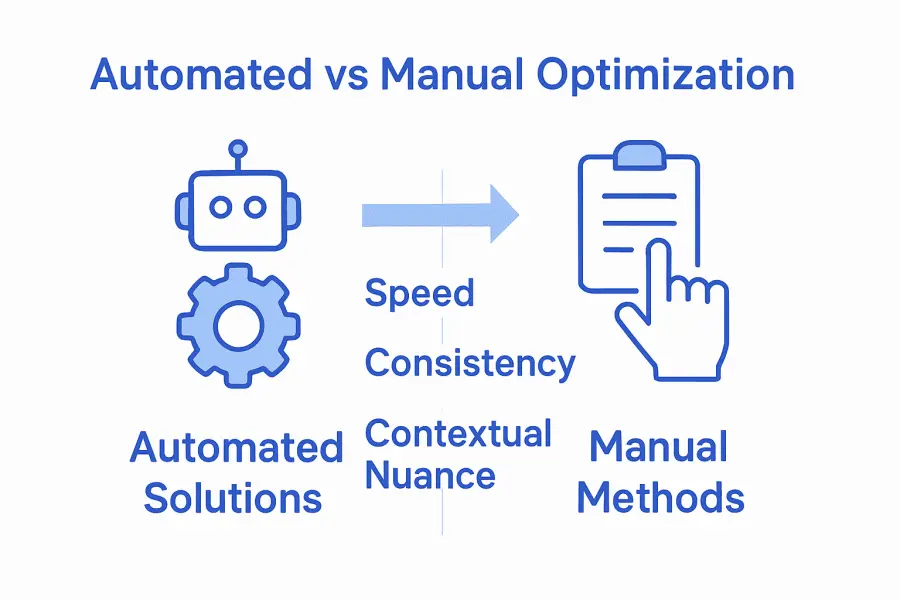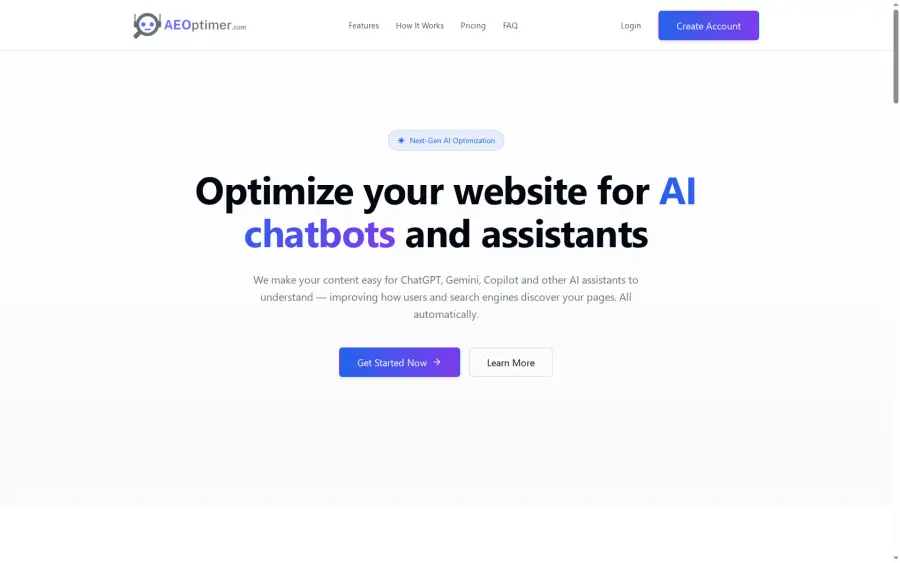Website Optimization for AI: Complete Expert Guide

More than 80 percent of online searches are now influenced by artificial intelligence platforms. As AI assistants like ChatGPT and Gemini carve new paths in information discovery, the rules of website optimization are rapidly shifting. Businesses that understand how to present their content for AI interpretation gain a visible edge in digital reach and relevance. This article uncovers practical strategies to ensure your website stands out in the results delivered by today’s generative AI tools.
Table of Contents
- Defining Website Optimization For AI Assistants
- Key AI-Focused Optimization Techniques Explained
- Automated Solutions Versus Manual Optimization Methods
- Essential Features: Structured Data And Content Updates
- Risks, Common Mistakes, And Compliance Concerns
- Maximizing AI Discoverability And Ranking Potential
Key Takeaways
| Point | Details |
|---|---|
| AI Optimization Focus | Website optimization for AI assistants emphasizes the need for structured, factual content that enhances AI interpretability and contextual representation. |
| Structured Data Importance | Implementing structured data and semantic HTML is crucial for improving AI discoverability and accurately conveying information. |
| Hybrid Optimization Approach | Combining automated tools with manual optimization ensures both efficiency and nuanced, context-relevant adjustments for websites. |
| Ongoing Content Updates | Regular content updates and refinement are vital for maintaining relevance and enhancing AI-driven interactions for users. |
Defining Website Optimization for AI Assistants
Website optimization for AI assistants represents a strategic approach to making digital content discoverable, interpretable, and valuable for generative artificial intelligence platforms. According to Wikipedia, generative engine optimization (GEO) is the practice of adapting digital content to improve visibility in results produced by generative AI models.
At its core, website optimization for AI involves structured techniques designed to help large language models accurately retrieve, understand, and summarize website information. This process goes beyond traditional search engine optimization by focusing specifically on how AI tools like ChatGPT, Gemini, and Copilot process and present digital content.
 The goal is not just visibility, but precise contextual representation.
The goal is not just visibility, but precise contextual representation.
Key components of AI website optimization include:
- Implementing clear, structured metadata
- Using semantic HTML markup
- Creating comprehensive, factual content
- Ensuring logical content organization
- Providing direct, concise answers to potential queries
Website owners must recognize that AI assistants evaluate content differently from traditional search engines. These platforms prioritize comprehensive understanding, factual accuracy, and contextual relevance. By strategically preparing websites for AI discovery, businesses can significantly enhance their digital presence and information accessibility.
For a deeper exploration of how AI assistants discover websites, check out our complete guide on AI website discovery.
Key AI-Focused Optimization Techniques Explained
Website optimization for AI platforms demands a strategic, multifaceted approach that goes beyond traditional search engine techniques. Research from arXiv highlights the complexity of optimizing compound AI systems, emphasizing the need for systematic and nuanced strategies that address both numerical and language-based techniques.
Metadata Structuring emerges as a critical first step in AI-focused optimization. This involves creating rich, semantically meaningful metadata that provides clear context for AI assistants. Key elements include:
- Implementing schema.org structured data
- Using precise, descriptive meta tags
- Ensuring content hierarchies are logically organized
- Creating comprehensive, concise content summaries
Advanced optimization techniques also involve understanding how AI models process and interpret digital content. Research on hyper-parameter optimization suggests that the way information is structured can significantly impact how AI platforms retrieve and present website content. This means going beyond keyword stuffing and focusing on creating genuinely informative, well-structured content that AI can easily parse and understand.
Practical implementation requires a holistic approach. Website owners must focus on creating content that is not just readable by humans, but also easily interpretable by AI assistants. This includes using clear language, providing direct answers, and maintaining a logical flow of information. For a comprehensive breakdown of page-level optimization strategies, explore our guide to page optimization for AI and SEO visibility.
Automated Solutions Versus Manual Optimization Methods
The landscape of website optimization is rapidly evolving, with a growing tension between automated solutions and manual optimization methods. Research from Academic Oxford University Press highlights the emerging trend of ‘learn to optimize’ approaches, which aim to accelerate configuration processes by leveraging intelligent learning techniques from training instances.
Automated optimization solutions offer several compelling advantages:
- Consistent and rapid analysis of website content
- Real-time performance tracking
- Scalable improvements across multiple pages
- Reduced human error
- Cost-effective long-term management
Research on machine learning optimization methods suggests that while automated tools provide significant efficiency, manual review remains crucial for nuanced, context-specific optimizations. The ideal approach combines algorithmic precision with human insight, ensuring websites are both technically optimized and contextually relevant.

Website owners must recognize that no single method is universally superior. Hybrid approaches that blend automated scanning and manual refinement typically yield the most comprehensive results. For those seeking a structured approach to ongoing website optimization, our guide to monthly website optimization steps provides a detailed roadmap for balancing automated and manual techniques.
Essential Features: Structured Data and Content Updates
Structured data and content updates form the backbone of modern AI-friendly website optimization strategies. According to Wikipedia, an adaptive website dynamically adjusts its structure and content in response to user interactions, creating a more intelligent and responsive digital experience.
Key components of effective structured data implementation include:
- Schema.org markup
- Semantic HTML tags
- Comprehensive metadata
- Clear content hierarchies
- Machine-readable information formats
Research on unsupervised machine learning reveals that sophisticated systems can adapt to data patterns without explicit labeling, suggesting that websites must become increasingly dynamic and self-optimizing. This means moving beyond static content to creating adaptive, intelligent web experiences that can evolve based on user interactions and emerging AI technologies.
The most successful websites treat content updates as an ongoing process, not a one-time event. Regular refinement ensures that information remains current, relevant, and easily interpretable by AI assistants. For website owners seeking a structured approach to keeping their content fresh and optimized, our guide to website content update steps provides a comprehensive roadmap for maintaining an AI-friendly digital presence.
Risks, Common Mistakes, and Compliance Concerns
Website optimization for AI platforms involves navigating a complex landscape of potential risks and technical challenges. Research from MDPI highlights critical insights into optimization approaches, particularly emphasizing the importance of understanding potential security and compliance vulnerabilities in AI-driven systems.
Common mistakes in AI website optimization often stem from fundamental misunderstandings about how AI assistants process information. These critical errors include:
- Overstuffing content with keywords
- Neglecting semantic markup
- Failing to provide clear, concise information
- Inconsistent metadata across pages
- Ignoring structured data requirements
Systematic research on machine learning optimization methods reveals that emerging paradigms demand more nuanced approaches to content strategy. Website owners must be vigilant about potential compliance issues, particularly regarding data representation, transparency, and ethical AI interactions. This means ensuring that content is not only technically optimized but also maintains high standards of accuracy, relevance, and user value.
Navigating these challenges requires a proactive and informed approach. Website owners should regularly audit their content, stay updated on AI assistant guidelines, and prioritize user experience alongside technical optimization. For those seeking a comprehensive approach to minimizing risks and maintaining compliance, our manual review guide provides essential insights into best practices for website optimization.
Maximizing AI Discoverability and Ranking Potential
AI discoverability has become a critical metric for websites seeking to remain competitive in the digital landscape. Research from Emeritus highlights sophisticated strategies for enhancing performance, including advanced techniques like AutoML and quantum computing integration that can dramatically improve a website’s visibility to AI platforms.
Key strategies for maximizing AI discoverability include:
- Creating semantically rich, structured content
- Implementing comprehensive schema markup
- Ensuring clear, concise information architecture
- Developing content that directly answers potential queries
- Maintaining consistent, high-quality information across pages
Research on AI-driven optimization reveals that successful discoverability goes beyond traditional SEO techniques. Modern AI assistants prioritize content that demonstrates depth, accuracy, and contextual understanding. This means websites must craft content that not only includes relevant keywords but provides comprehensive, nuanced information that AI can easily interpret and relay to users.
Website owners looking to improve their AI ranking potential should focus on creating intelligent, adaptable content strategies. For a comprehensive approach to enhancing content discoverability, our content discoverability guide offers in-depth insights into making websites more accessible and attractive to AI platforms.
Boost Your Website’s AI Visibility with Automated Optimization
The challenge of optimizing your website for AI assistants like ChatGPT and Gemini can feel overwhelming. From mastering structured data to keeping content fresh and AI-friendly, the demands are constantly evolving. This expert guide highlights the critical need for precise metadata, adaptive content updates, and ongoing manual reviews to stay ahead. If you want to move beyond guesswork and manual effort, it is time to embrace smart automation that works tirelessly behind the scenes.

Discover how aeoptimer.com simplifies website optimization by automatically adding structured data and updating your content monthly without changing your site’s look. Our platform helps you maintain AI discoverability, compliance, and ranking potential without technical hassle. Take control of your digital presence today and ensure your content is always aligned with the latest AI assistant requirements. Start with our comprehensive optimization solutions and see how effortless ongoing AI-friendly website management can be.
Frequently Asked Questions
What is website optimization for AI assistants?
Website optimization for AI assistants involves adapting digital content to be discoverable and interpretable by generative AI platforms, using structured techniques to enhance visibility and contextual representation.
How does AI website optimization differ from traditional SEO?
AI website optimization focuses specifically on how AI tools process digital content, prioritizing contextual relevance, factual accuracy, and structured data, while traditional SEO generally emphasizes keywords and search engine visibility.
What techniques should I use for optimizing my website for AI?
Key techniques include implementing clear structured metadata, using semantic HTML markup, creating comprehensive content, ensuring logical organization, and providing direct, concise answers to potential user queries.
What are common mistakes to avoid in AI website optimization?
Common mistakes include overstuffing content with keywords, neglecting semantic markup, failing to provide clear information, maintaining inconsistent metadata, and ignoring structured data requirements.
Recommended
- Page Optimization Explained: Boost AI and SEO Visibility | AEOptimer.com
- Why AI Optimized Websites: Complete Guide 2024 | AEOptimer.com
- Monthly Website Optimization Steps for AI Discoverability | AEOptimer.com
- Complete Guide to Why Websites Need Optimization | AEOptimer.com
- AI in Search Rankings: The Complete Expert Guide - FAII





